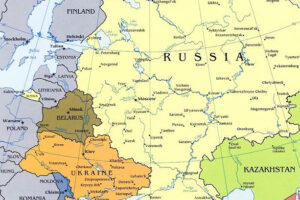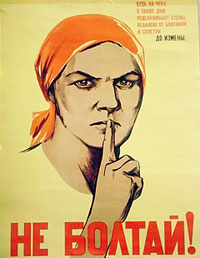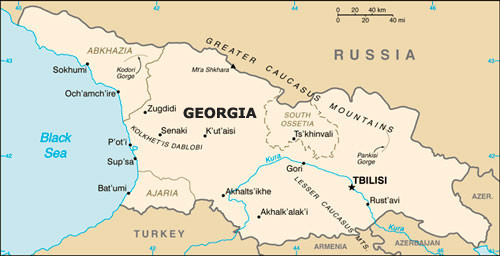Awakening a new generation of activists in Eurasia; An emerging young, urban population has begun to challenge the lasting legacies of the Soviet era

(Opendemocracy.net – Erica Marat – September 5, 2019)
Erica Marat, PhD, is an Associate Professor at the College of International Security Affairs, National Defense University. She is the author of The Politics of Police Reform: Society against the State in Post-Soviet Countries (Oxford University Press, 2018).
A new wave of anti-government mobilization has swept across the Eurasian countries that once comprised the Soviet Union. Crowds in Moscow have mobilised to call for free and fair city council elections this September. Despite massive arrests and police violence, the protestors have returned every weekend for seven weeks. Similarly, in June a new political movement “Oyan, Kazakhstan!” (Wake up, Kazakhstan) was founded by urban youths demanding political freedoms after the resignation of Nursultan Nazarbayev, Kazakhstan’s president for three decades. It now commands hundreds of followers across the country. Last year in Yerevan, Armenia, young activists led anti-government protests demanding the resignation of long-serving leader Serzh Sargsyan. The list goes on.
 These activists are part of a generation that was born or came of age since the collapse of the Soviet regime. These 20- and 30-somethings seek to define their political landscape by wresting power from older, incumbent politicians who cling to the autocratic tendencies of communism. They are internet savvy and have traveled abroad. They now see themselves as agents of change, willing to risk more than their parents could stomach.
These activists are part of a generation that was born or came of age since the collapse of the Soviet regime. These 20- and 30-somethings seek to define their political landscape by wresting power from older, incumbent politicians who cling to the autocratic tendencies of communism. They are internet savvy and have traveled abroad. They now see themselves as agents of change, willing to risk more than their parents could stomach.
The activists draw from many resistance tactics and have different political agendas, ranging from wholesale political reforms to merely claiming the right to protest in public. For example, in Ukraine, young political activists mobilised into powerful professional networks after the violent regime change in 2014, pledging to collaborate with parliament and government agencies to implement democratic reforms. Ukraine’s newly formed government is the youngest in Europe, led by 35-year old prime minister Oleksiy Honcharuk. By contrast, Kazakhstan’s young activists are just beginning to exercise their constitutional right of free assembly and normalise collective action in a public space.
Despite varying degrees of political freedoms, there are undeniable parallels across countries. Unlike the civil society groups of the 1990s and 2000s, these activists are not aided by international NGOs. Their funding is more likely to come from online crowdsourcing than from international donor organisations. Their repertoires of resistance emphasize performance through contemporary art displays, music, slogans and short videos. They adapt strategies from protesters in Puerto Rico, Hong Kong, and from neighbouring states with Soviet history. Some have backgrounds in feminist and environmental advocacy and are steeped in both local and global political discussions.
Recognising that asserting their civic rights in an authoritarian country comes with risks, they are fearless in the face of police arrests. “Activists have realized that even a 10-day detention is not that scary,” says Kassymkhan Kapparov, one of the founding members of “Oyan, Kazakhstan!”. Lyubov Sobol, an opposition candidate excluded from the ballot for a seat in the Moscow city Duma, live-streamed her speech to supporters as police broke down the doors of her office to detain her. The stream ended as she ordered the police to answer “On what basis [are you here]?”, once they finally entered her office.
By defying the government’s threat to use punitive action, these young activists test the boundaries of the state’s permissible use of violence and its other subversive means to tame resistance. Governments have begun to invent new ways to preempt or contain this new type of protest. In Russia, for example, parents who bring small children to protests were threatened to have their children taken away on the grounds of child abuse. In Kazakhstan, three young activists were called up for military service. However, none of these tactics have significantly deterred participation in future rallies.
Resistance against the status quo goes hand-in-hand with demands for a freer political future – a fair society with an accountable government. In Bishkek, Kyrgyzstan, a dozen urban activists are fighting to end the influence that wealthy individuals’ hold over top political leaders ahead of parliamentary elections in 2020. In Chisinau, Moldova, young activists rallied against oligarchic corruption in politics ahead of the parliamentary elections last February. Youth collectives “Free Moldova” and “OccupyGuguță” united urban activists, including the Moldovan diaspora, who campaigned to inform the public about the scale of corruption among politicians running in the elections.
 In Tbilisi, Georgia, activists protested against the visit of a Russian lawmaker Sergey Gavrilov, demanding the government to cut diplomatic ties with Russia, which occupied two Georgian provinces in 2008. Georgian police responded with violence against protestors, adding a grievous dimension to the ongoing protests.
In Tbilisi, Georgia, activists protested against the visit of a Russian lawmaker Sergey Gavrilov, demanding the government to cut diplomatic ties with Russia, which occupied two Georgian provinces in 2008. Georgian police responded with violence against protestors, adding a grievous dimension to the ongoing protests.
The recent wave of activism reflects a long delayed post-colonial rejection of authoritarianism and revives the brief debate about civic resistance at the end of the old Tsarist regime. In Kazakhstan, activists invoke the memory of Alash Orda (1917-1918), an autonomous governance structure comprised of intelligentsia who resisted the Red Army. In Ukraine and Georgia, activists regard the Soviet era as a dark period in their history, vowing to shape a unique future for their counties that is free from Kremlin influence.
Going forward, this new generation of political activists will face challenges beyond economic development, the common issue of choice for post-Soviet elites. They must address migration, cultural conservatism, and the structural divide between urban and rural populations. As in the United States, parts of Europe, India, and Australia, large portions of the population leaning towards populism and nationalism over liberal democracy.
They must also contend with existing institutions ridden with inefficiency and corruption. Security structures, in particular, still rely on their Soviet-era playbook that favours allegiance over the rule of law. Militarised and politically loyal, the police, intelligence services, and judicial systems fallback on their punitive functions, despite the collapse of the communist regime. The new generation of activists will need to make these institutions accountable to the public not just to political incumbents.
Almost 30 years since the end of the Soviet regime, the political structure is poised for a dramatic change. Younger, mostly urban, individuals are trying to enter the political realm-and to force out the musty doddering incumbents. Political change may be slow and interrupted by police crackdowns, but the grievances and motivations of the new wave of activists are unlikely to subside. Their own futures are at stake.
Article also appeared at opendemocracy.net/en/odr/awakening-new-generation-activists-eurasia/ bearing the following notice:
 This article is published under a Creative Commons Attribution-NonCommercial 4.0 licence. If you have any queries about republishing please contact us. Please check individual images for licensing details.
This article is published under a Creative Commons Attribution-NonCommercial 4.0 licence. If you have any queries about republishing please contact us. Please check individual images for licensing details.
